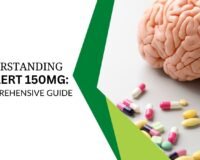What is pregabalin?
The FDA first authorized pregabalin in 2004 as an anticonvulsant and antiepileptic drug. The brain chemicals that signal the nervous system to pain are likewise impacted by pregabalin. It slows down the brain impulses. Pregabalin is used to treat fibromyalgia pain, diabetic neuropathy, post-herpetic neuralgia, herpes zoster pain, and spinal cord injury pain.
Before taking this medicine:
If you are allergic to pregabalin, you should avoid using it. Inform your doctor if you have ever experienced any of the following conditions: kidney disease (or if you are on dialysis), diabetes (unless you are taking pregabalin to treat diabetic neuropathy), chronic obstructive pulmonary disease (COPD), a mood disorder, depression, or suicidal thoughts; a bleeding disorder, or low levels of platelets in your blood; or a severe allergic reaction. (angioedema).
How should I take pregabalin?
Read prescription manuals or instructions sheets for pregabalin and take the drug exactly as directed by your doctor. Your doctor could occasionally change the dose. Pregabalin should be taken every day at the same time, with or without meals. Do not chew, break, or crush the extended-release pregabalin tablets; instead, swallow them whole. Pregabalin liquid dosage should be exact. Use a pharmaceutical dose-measuring tool or the dosage syringe that was given. (Not a kitchen spoon). See your doctor right away if your symptoms persist or get worse.
Even if you feel fine, avoid abruptly stopping your pregabalin dosage. Stopping abruptly might result in unpleasant withdrawal symptoms or more frequent seizures. Follow your doctor’s advice regarding your dosage for at least one week before fully stopping. Wear or carry medical identification so others know you take seizure medicine in case of an emergency.
Missed Dosage:
Pregabalin should be taken as soon as you recall if you miss a dosage. Skip the missing dosage if it is almost time for your next dose. Never combine two dosages into one. Obtain immediate medical help. Steer clears of booze. It could exacerbate some of the pregabalin’s negative effects. Prior to knowing how pregabalin may impact you, avoid driving or engaging in other risky activities. Your reflexes can be slower.
Warnings:
A severe allergic response to pregabalin is possible. If you get hives or blisters on your skin, difficulty breathing, or swelling of your face, mouth, or throat, stop taking pregabalin and get immediate medical attention. Even if you feel fine, avoid abruptly stopping your pregabalin dosage. Sudden cessation may result in withdrawal symptoms. Call your doctor if you experience weight gain or edema in your hands or feet while taking pregabalin if you have diabetes or heart issues. Some pregabalin users have reportedly experienced suicidal thoughts. Be alert to any modifications in your symptoms or mood. Inform your doctor of any new or escalating symptoms.
What other drugs will affect pregabalin?
Combining pregabalin with other breathing-slowing medications might result in fatal adverse effects. Before using an opioid, a sleeping aid, a cold or allergy drug, a muscle relaxant, or a prescription for anxiety or seizures, see your doctor. Inform your doctor about all of your current medications, especially any ACE inhibitors such as benazepril, captopril, enalapril, fosinopril, lisinopril, moexipril, perindopril, quinapril, ramipril, or trandolapril, as well as oral diabetic medications pioglitazone and rosiglitazone. Breathing issues with pregabalin can be fatal. Someone caring for you should contact for emergency medical assistance if your breathing is slow and your pauses are long, if your lips are blue, or if you are hard to rouse up. The likelihood of breathing issues may be higher in elderly folks or COPD patients. If you have diabetes, you should immediately notify your doctor if you develop any new sores or other skin issues. Pregabalin commonly causes side symptoms such as dizziness, sleepiness, swollen hands and feet, difficulty concentrating, increased hunger, weight gain, dry mouth, and impaired vision.







